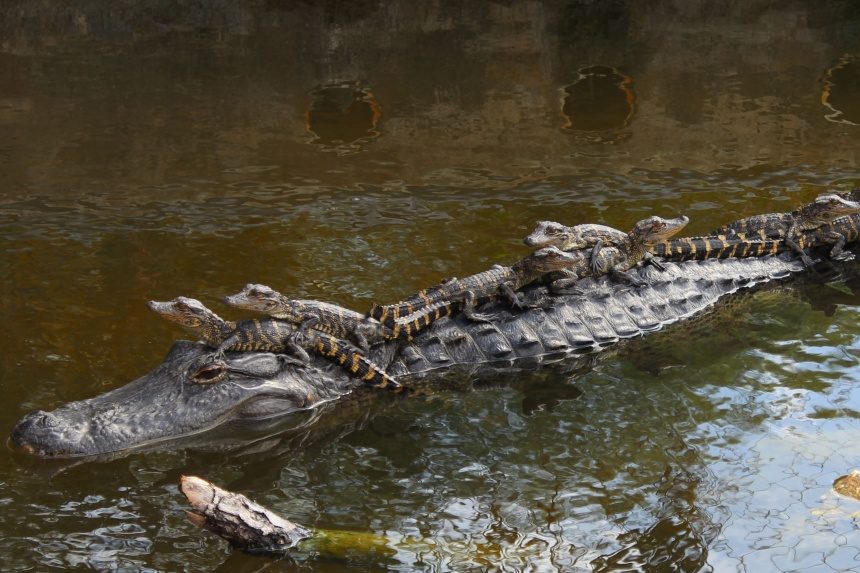Managing editor and logophile Andy Hollandbeck reveals the sometimes surprising roots of common English words and phrases. Remember: Etymology tells us where a word comes from, but not what it means today.
You see a long green snout and a pair of eyeballs floating just above the water on a river. You know enough not to dive in beside it, but is it a crocodile or an alligator? Understanding where these two similar beasts got their names probably won’t help you answer that question, but then again . . .
Crocodile is the older name by a long shot. According to Herodotus, the Greek historian who wrote during the fifth century B.C., there was a type of lizard that liked to lounge up on the pebbly banks of rivers, so its name was created by combining kroke “gravel, pebbles” and drilos “worm.” The name krokodilos — literally a “pebble worm” — was later transferred to the large river reptile we know as the crocodile.
Although there is some disagreement over the accuracy of Herodotus’ explanation, this is still the etymology given in a number of dictionaries.
The Greek krokodilos became the Latin crocodilus, which is the source of this beast’s order name Crocodilia. You’d think this might then directly become the English crocodile, but no: In Medieval Latin, the word got mixed up a little, becoming cocodrillus, which by the 13th century became the Old French cocodrille, which is the form that seeped its way into English. At the beginning of the 14th century, we start finding the animal named in English texts with spellings like cokedrille, cocodril, and kokedrille.
But by the mid-16th century, some in the educated classes noticed that the classical Latin spelling had been mangled — Latin being the primary language of science and education — and so the spelling was altered to conform to Latin (and also to French, which had corrected its ways as well).
Alligator, as I mentioned, has a much shorter history: At about the same time that the spelling of crocodile was being “corrected,” Spanish explorers in the New World were finding large “lizards” in the rivers and swamps north of the Gulf of Mexico. They called this monster el lagarto de Indias “the lizard of the Indies.” El lagarto, which simply means “the lizard,” was reanalyzed over time as a single word, and soon we start finding references using corrupted terms like aligarto.
Samuel Johnson codified the modern spelling alligator by including it as an entry in his landmark 1755 dictionary. You might find his definition of alligator surprising, though:
ALLIGA′TOR. The crocodile. This name is chiefly used for the crocodile of America, between which, and that of Africa, naturalists have laid down this difference, that one moves the upper, and the other the lower jaw; but this is now known to be chimerical, the lower jaw being equally moved by both.
An alligator is a crocodile? Samuel Johnson was, of course, a man of words, not of science — but he’s not entirely wrong.
There are currently only two known, living species of alligators on the planet. (And, oddly, they’re on opposite sides of the planet — in America and China.) In zoological nomenclature, they belong to the family Alligatoridae, which is part of the order Crocodilia. So alligators, in a manner of speaking, really are a type of crocodile. The opposite, of course, is not true.
Usually, though, when someone asks, “Is that an alligator or a crocodile?” the comparison is to what are called “true crocodiles,” those belonging to the subfamily Crocodylinae.
That doesn’t really help you decide what animal you’re looking at, though. But remembering that there are only two species of alligators can help you narrow it down. If the long, low, many-toothed reptile you’re looking at lives in Africa, Australia, or South America, what you’ve got there is a crocodile.
And if it lives in Europe, then it’s escaped from a zoo, because there are no native species of either alligators or crocodiles in Europe.
Featured image: Shutterstock
Become a Saturday Evening Post member and enjoy unlimited access. Subscribe now




Comments
It’s pretty interesting how ‘crocodile’ was fairly close to the familiar 3 syllable word we know, going all the way back to the beginning with the Greeks, then getting messed up in more recent 13th century, then being corrected in the 1500’s. But before then, ‘cocodrillus’, ‘cokedrille’, ‘cocodril’, ‘kokedrille’. Seriously??! Glad that was later re-corrected.
OH! I’m getting Amazon Coca-Cola ads popping up right now as I type this!
Interesting about the alligators too. They’re both great animals, to be admired from afar. I really hate hearing stories about stupid people breaking into elephant sanctuaries, or trying to feed exotic monkeys off-limits for good reason. If the person is attacked, that’s on them. After their hospital stay and the medical bills, they should have a massive fine and jail time awaiting them too. At no time should the animal ever be put down in these cases.